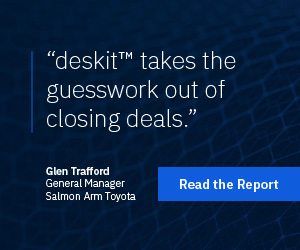It takes a lot of courage to step into a bright spotlight and share an intensely personal story about mental health and the impact it can have on your life, and your career.
That’s what David Adams, President and CEO of the Global Automakers of Canada, did earlier this week during an in-person and livestreamed event in support of May’s Mental Health Awareness month.
Canadian auto dealer applauds Adams for his courage in sharing his story that can now help others.
Adams and his industry association helped pull together this event that was aimed at opening up a conversation about mental health in the auto industry. The event was called: Road to Resilience: Mental Health Awareness for Automotive Professionals.
During the event, Adams was part of a panel and he shared his story of trauma growing up and later as an adult.
Adams talked about two failed marriages, one of which cost him his relationship with his two children, and he said he underwent therapy for years and takes prescription medication to deal with mental illness. He became emotional at times talking about his life.
“Part of being a leader is probably some strength, but the other side of that is vulnerability, which isn’t often shared,” said Adams at the conference in Toronto at Dentons Law Office.
It included in person attendees and others watching via livestreaming done by Universus (publishers of Canadian auto dealer), one of the event’s sponsors. Other sponsors included the Royal Bank of Canada, Automotive News Canada, and Dentons.
“I’m 63 and I’m at the end of my career. I’m not sure I would be as courageous as somebody at the beginning of their career to come up and tell you everything I’ve told you because I would be afraid of the stigma attached to that,” said Adams. “You don’t know how you are going to be perceived. On the other hand, I’m at a stage now in my life where I kind of don’t care what other people think to an extent.”
He said it can be enslaving if we’re always worried about what other people think.
“What I’ve learned a little bit is you always have a choice,” said Adams. “The other thing is every choice has a consequence. Even if you don’t do anything, that’s still a choice and that choice has a consequence as well.
“When I reflect back on my life, it’s all about choices I made and consequences arriving from those choices.”
He described himself as shy and emotional growing up and always felt he didn’t fit in that well. He said his father, who worked for American Motors, the smallest of the automakers in Canada back then, spent a lot of time at the office. Adams said that didn’t leave time for him and his two siblings.
“The thing I learned about our parents is you really have to cut them some slack and recognize what their history and their challenges are as well,” said Adams.
He described a couple things that happened to him as a child and traumatized him. He said when he was five or six he attempted to kiss a dog, who didn’t like it and bit off part of his top lip, which required constructive surgery.
“I was always self conscious about that,” said Adams.
He also said his dad always wanted him to have a brush cut and it became traumatic because of the names he was called by other kids. “They may sound like nothing, but when you’re a child they are something,” said Adams.
In later years, he considered a career in the ministry, but said he didn’t have the commitment to follow through with it.
He acknowledged being unfaithful in his first marriage, which he said he was sharing publicly for the first time, and his marriage broke down. “My wife was understandably hurt, angry, you name it,” said Adams.
He said his wife accused him of being emotionally and physically abusive to the children, who were aged nine and 11 at the time, and he had to go through the Children’s Aid Society just to see them. He said when he was finally able to see his kids, it had to be supervised and the access was at his wife’s home. In the end, he said he lost his relationship with his children.
Adams said he did therapy for a number of years and reached the point where his therapist felt he was making steady progress.
“But it’s not like okay, I’m done,” he said. “It’s something that is with you every day. Every day you get up and you choose who you are going to be with and how you are going to show up.
“I remember someone once said, comparison is the worst thing, comparing yourself to others,” said Adams. “The only comparison you need to make is who you are today versus who you are going to be tomorrow. Did you change? Did you improve? Did you get better?
“The world isn’t black and white. The world is grey. Everything in life is basically on a continuum. On one hand you have to be able to say I’m perfect and I’m okay as I am. The other end of the spectrum is I can always be better.”
He said he initially resisted taking medication because it was going to make him numb to what he was feeling. He thought it might have been a macho thing to resist but reached a point where he realized taking medication was what was needed to control his illness.
He shared a couple of passages, one of which basically said we must learn to regard people less in the light of what they do or omit to do and more in the light of what they suffer.
“There’s a lot of truth to that because in a lot of ways every one of us is suffering in some regard, and I think that’s the reality of the human condition as well,” said Adams. “We are going to suffer at some point in (our) life and there’s no getting around that.
“The only way to get through suffering is to go through it. You can’t go around it. There’s that old saying, what you resist persists. The only to deal with your challenges and your problems and your difficulties and your suffering is to go through that suffering.”
Canadian auto dealer applauds Adams for sharing his experiences, and we encourage others in our industry to continue the dialogue to ensure that we support one another, and build the resilience that was the theme of the event.



















